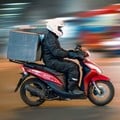Bob Group, an e-commerce ecosystem, has brought six new offerings of smart locker and counter delivery services to KwaZulu-Natal. The six new offerings went live in Durban on 1 May following the success of offerings in Gauteng and Cape Town.

Anita Erasmus and Jaco Roux of Bob Group. Image supplied
The first “Bob Box” locker was placed at Menlyn Maine in Pretoria in June 2023 and 40 more can now be found across Gauteng and Cape Town.
The global smart parcel locker market is estimated to reach some R37bn by 2030, according to Fortune Business Insights.
Bob Group's head of product, Jaco Roux says the Bob Box service is driven primarily by the market need for more flexible and convenient delivery options for online shoppers.
“Traditional delivery methods often pose challenges such as missed deliveries and security concerns. Bob Box addresses these issues by providing smart lockers and counters where customers can collect their parcels at their convenience, ensuring that they have access to their purchases even if they are not home to receive them directly,” Roux says.
For retailers, the offering provides an additional delivery option that is both cost-effective and convenient. Retailers send packages to selected locker locations, ensuring they reach customers efficiently and remain accessible until collection.
From the customer's perspective, the smart locker-and-counter delivery/collection service offers a convenient and secure method of receiving or returning purchases.
Customers can choose a locker location at checkout on participating websites. Once their package is delivered to the selected locker, they receive a notification with a secure PIN which is used to access the locker at a time that suits their schedule.
Bob Group's head of business, Anita Erasmus says the system can help reduce costs associated with redeliveries and minimise customer service inquiries related to delivery issues.
Given South Africa’s high crime rate, lockers have been placed at locations that offer some level of security. Smart technology is then employed to monitor the movement of parcels.
For now, the company is positioning the lockers at retail properties but plans include expansion to petrol stations, universities and estates.
It has also recognised the potential to offer the solution to townships, where couriers often find it difficult to make door-to-door deliveries and shoppers may not be able to afford the surcharges associated with this type of delivery.
Erasmus adds that the lockers are battery-powered to offset the effects of load shedding while maintenance is kept to a minimum by ensuring the hardware and firmware are kept as simple as possible.
“It is called a locker network for a reason,” Erasmus concludes.
“A network of lockers is needed for a solution like this to offer maximum benefit. But as with all good things, one just needs to start somewhere, which is what we have done. For now, we are focusing on the three main centres and increasing accessibility within these areas. We will then look at expanding to the rest of the country. This is a question of when not if.”































